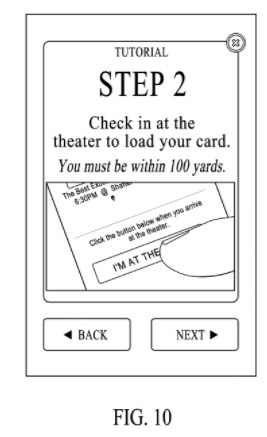Previously, MoviePass CEO Mitch Lowe stated that his company could watch how their subscribers drive home from the movie and see where else they went. Remember Uber’s post-ride tracking? This sounds a lot like it. Uber pulled the post-ride tracking last year.
Now, Media Play News includes quotes in the mobile fo an article about MoviePass where they project it will pass 5 million subscribers, and the outlet has since posted a full quite showing exactly what Lowe had said.
Mitch Lowe (via Media Play News):
We get an enormous amount of information. Since we mail you the card, we know your home address, of course, we know the makeup of that household, the kids, the age groups, the income. It’s all based on where you live. It’s not that we ask that. You can extrapolate that. Then because you are being tracked in your GPS by the phone, our patent basically turns on and off our payment system by hooking that card to the device ID on your phone, so we watch how you drive from home to the movies. We watch where you go afterwards, and so we know the movies you watch. We know all about you. We don’t sell that data. What we do is we use that data to market film.
We reached out to MoviePass and have gotten a response. The company didn’t say anything further about the statement from a spokesperson.
At MoviePass our vision is to build a complete night out at the movies. We are exploring utilizing location-based marketing as a way to help enhance the overall experience by creating more opportunities for our subscribers to enjoy all the various elements of a good movie night. We will not be selling the data that we gather. Rather, we will use it to better inform how to market potential customer benefits including discounts on transportation, coupons for nearby restaurants, and other similar opportunities. Our larger goal is to deliver a complete moviegoing experience at a price anyone can afford and everyone can enjoy.
If you carefully look over the statement, you notice that MoviePass says it keeps the information it gathers private, but doesn’t provide confirmation on exactly how and when it’s using subscriber GPS to keep a track of their travel habits post-movie watching. Lowe’s full comments addresses some fo the controversy by stating that his company starts with the demographic and publicly available information that many companies get based on things like your credit card information and address.
At the same time, if you look through MoviePass’s privacy policy, it only mentions a “single request” for location, and nothing about tracking your travel habits before and after.
THEATER CHECK-INs
MoviePass® requires access to your location when selecting a theater. This is a single request for your location coordinates (longitude, latitude, and radius) and will only be used as a means to develop, improve and personalize the service. MoviePass® takes information security very seriously and uses reasonable administrative, technical, physical and managerial measures to protect your location details from unauthorized access. Location coordinate data is transmitted via Secure Socket Layer (SSL) technology into password-protected databases.
So what is exactly happening here from MoviePass? We don’t have much clarification from MoviePass, but we may have an answer in the patient Lowe referenced. A few days ago, MoviePass sued a similar service called Sinemia for violating its patent. The patent covers using a reloadable card and verifying the customer’s location using GPS.

The patent in question, US8484133B1 (co-authored by MoviePass co-founder and COO Stacy Spikes) can be viewed online and shows how the service works. Per patent details, it covers booking a ticket, making sure the card has the correct amount, recording when and where it was use and for what.
Speaking in terms of GPS, it only mentions it in once instance and that’s to verify if a user is within 100 yards of the selected theater before loading the appropriate amount of movie on the MoviePass card, which then operates like a virtual credit card. The GPS mentioned is there to help stop fraud, while the location of the movie and what happened at the location is tied to the MoviePass card itself. If MoviePass is currently doing more GPS tracking like Lowe has suggested, it’s not mentioned in the patent.
It’s worth mentioning hat Helios and Mathewson Analytics Inc. Recently had bought a large stage in MoviePass, which could change the way the company operates in the future. In a Wired profile last year, CEO Lowe didn’t mention anything about GPS, but rather had proposed Helios maps to suggest any and all nearby locations (such as restaurants and parking), then pay for them using the same card and on one monthly bill.
MoviePass patent details:
Once the membership card is in hand, the member can book a movie online using the web site of the service on a PC, or the service app on a smart device. At this point, the card has no funds on it. As shown in the debit card reload process 105, the member selects a movie to watch on either the MoviePass™ website or mobile application (app). The member is then directed to check-in at the chosen theater. When the member is at the theater and checks in using the mobile app, MoviePass™ confirms the location of the member. This verifies: 1) that the member is at the correct theater at the correct time for the booked movie; and 2) that the person checking in is indeed the member. The identity of the member is verified to a high degree of certainty based on study results that show the likelihood of a mobile phone owner to loan the phone to another for several hours is extremely low. According to this aspect of the invention, while a person might loan their membership card to another person, the card cannot be used unless the phone is present with the card at the theater at the time of the ticket purchase. This reduces the possibility of “membership sharing” to a minimum. In an embodiment, the location is verified using the global positioning system (GPS) capabilities of the mobile device. In alternate embodiments, a third party location service can be used instead of the member’s own device. Once the member’s location is verified as being the location of the selected theater, MoviePass™ requests the credit card service to place funds on the card. The card is instantly loaded and the member can then purchase the theater ticket at the theater kiosk or box office.





